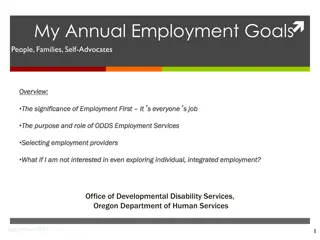The Impact of Collaborative Economy on Employment and Social Security in the EU
The European Parliament Committee on Employment and Social Affairs explored the effects of business models, including the platform economy, on employment and social security in the European Union. The collaborative economy, involving service providers, users, and intermediaries, creates opportunities for entrepreneurship and job growth while promoting social and environmental sustainability. Responsible development of these models can lead to a more efficient economic system with better resource allocation.
Download Presentation

Please find below an Image/Link to download the presentation.
The content on the website is provided AS IS for your information and personal use only. It may not be sold, licensed, or shared on other websites without obtaining consent from the author.If you encounter any issues during the download, it is possible that the publisher has removed the file from their server.
You are allowed to download the files provided on this website for personal or commercial use, subject to the condition that they are used lawfully. All files are the property of their respective owners.
The content on the website is provided AS IS for your information and personal use only. It may not be sold, licensed, or shared on other websites without obtaining consent from the author.
E N D
Presentation Transcript
European Parliament Committee on Employment and Social Affairs Public Hearing 12 July 2017 The impact of business models, including the platform economy, on employment and social security in the European Union. Elizabeth Douet, Founding Team Lead Sharing Economy Ireland
suggestions how to approach 21stcentury work & social security clarity contributions & challenges collaboration page 02 your logo
collaborative economy sharing economy
Collaborative Economy refers to business models where activities are facilitated by collaborative platforms that create an open marketplace for the temporary usage of goods or services often provided by private individuals. The collaborative economy involves three categories of actors: (i) service providers who share assets, resources, time and/or skills these can be private individuals offering services on an occasional basis ( peers ) or service providers acting in their professional capacity ("professional services providers"); (ii) users of these; and (iii) intermediaries that connect via an online platform providers with users and that facilitate transactions between them ( collaborative platforms ). Collaborative economy transactions generally do not involve a change of ownership and can be carried out for profit or not-for-profit.* * European Commission Communication on a European agenda for the collaborative economy 2016 (COM(2016) 356)
Sharing Economy Ireland current members page 05 your logo
If developed in a responsible manner the collaborative economy generates new and interesting entrepreneurial opportunities, jobs and growth, and frequently plays an important role in making the economic system not only more efficient, but also socially and environmentally sustainable, allowing for a better allocation of resources and assets that are otherwise under- used * conclusion * European Parliament resolution of 15 June 2017 on a European Agenda for the collaborative economy (2017/2003(INI))
Clarity on how new business models are changing the economy and the implications for employment and social security. clarity
contributions & challenges Joint focus on both the contributions and challenges presented by these changes.
Work collaboratively in defining solutions which will allow us to embrace the opportunities while mitigating challenges. collaboration
Sharing Economy Ireland contacts adress email online contact@ sharingeconomyireland.com sharingeconomyireland.com facebook/sharingeconomyireland twitter/SharingEconIE linkedin/sharingeconomyireland 13 Lad Lane Dublin 2 Ireland page 010 your logo























